Consulting Editors
Consulting Editors consist of a group of 40 noted scholars from major international academic institutions where various fields of Iranian Studies are taught and researched. These scholars advise the Editor on the choice of entries and authors, and on general policy relating to their area of expertise.
Hamid Algar - Islamic Heritage
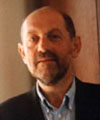 Hamid Algar is Professor Emeritus of Persian and Islamic Studies at the University of California, Berkeley. He obtained both his B.A. and his Ph.D. from the University of Cambridge, and was awarded an honorary Ph.D. from the University of Tehran. His main research interests are the history of Shi’ism in Iran, with particular attention to the 19th and 20th centuries, and Sufism, especially the Naqshbandi order and its development in Central Asia, India, Kurdistan, Turkey and the Balkans. His work on these topics has been published in a wide variety of languages.
Hamid Algar is Professor Emeritus of Persian and Islamic Studies at the University of California, Berkeley. He obtained both his B.A. and his Ph.D. from the University of Cambridge, and was awarded an honorary Ph.D. from the University of Tehran. His main research interests are the history of Shi’ism in Iran, with particular attention to the 19th and 20th centuries, and Sufism, especially the Naqshbandi order and its development in Central Asia, India, Kurdistan, Turkey and the Balkans. His work on these topics has been published in a wide variety of languages.
Abbas Amanat - Qajar History
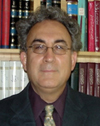 Abbas Amanat received his B.A. from Tehran University in 1971 and D.Phil. from Oxford University in 1981. His principal publications include Apocalyptic Islam and Iranian Shi'ism(2009), Pivot of the Universe: Nasir al-Din Shah and the Iranian Monarchy, 1831-1896 (1997) and Resurrection and Renewal: the Making of the Babi Movement in Iran, 1844-1850 (1989). He is the editor of Cities and Trade: Consul Abbott on the Economy and Society of Iran (1983),Crowning Anguish: Memoirs of a Persian Princess from the Harem to Modernity (1995) and coeditor of Imagining the End: Visions of Apocalypse from Ancient Middle East to Modern America (2002); Shari’a: Islamic Law in the Contemporary Context (2007); and U.S.-Middle East Historical Encounters: A Critical Survey (2007). He also edited The United States and the Middle East: Diplomatic and Economic Relations in Historical Perspective (2000) and co-edited The United States and the Middle East: Cultural Encounters (2002) and Apocalypse and Violence (2004).
Abbas Amanat received his B.A. from Tehran University in 1971 and D.Phil. from Oxford University in 1981. His principal publications include Apocalyptic Islam and Iranian Shi'ism(2009), Pivot of the Universe: Nasir al-Din Shah and the Iranian Monarchy, 1831-1896 (1997) and Resurrection and Renewal: the Making of the Babi Movement in Iran, 1844-1850 (1989). He is the editor of Cities and Trade: Consul Abbott on the Economy and Society of Iran (1983),Crowning Anguish: Memoirs of a Persian Princess from the Harem to Modernity (1995) and coeditor of Imagining the End: Visions of Apocalypse from Ancient Middle East to Modern America (2002); Shari’a: Islamic Law in the Contemporary Context (2007); and U.S.-Middle East Historical Encounters: A Critical Survey (2007). He also edited The United States and the Middle East: Diplomatic and Economic Relations in Historical Perspective (2000) and co-edited The United States and the Middle East: Cultural Encounters (2002) and Apocalypse and Violence (2004).
Mohammad Ali Amir-Moezzi - Shi'ism
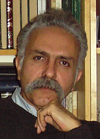 Mohammad Ali Amir-Moezzi (b. 1958, Tehran), D.Phil (1991) in Oriental and Religious Studies, University of Sorbonne (Paris), is Professor of Classical Islamic Theology and History of Quranic Exegesis at the Ecole Pratique des Hautes Etudes, Sorbonne. He is member of several scientific institutions and reviews’ boards (Arabica, Journal Asiatique, Studia Iranica, Studia Islamica…). He has published mainly on Islamic theology and mystic and Shi’i Islam including The Divine Guide in Early Shi’ism (New York, 1994), La religion discrète: croyances et pratiques spirituelles dans l’islam shi’ite (Paris, 2006), Dictionnaire du Coran (Paris, 2007), Revelation and Falsification: the Kitâb al-Qirâ’ât of Ahmad b. Muhammad al-Sayyârî (with Etan Kohlberg, Leiden, 2009).
Mohammad Ali Amir-Moezzi (b. 1958, Tehran), D.Phil (1991) in Oriental and Religious Studies, University of Sorbonne (Paris), is Professor of Classical Islamic Theology and History of Quranic Exegesis at the Ecole Pratique des Hautes Etudes, Sorbonne. He is member of several scientific institutions and reviews’ boards (Arabica, Journal Asiatique, Studia Iranica, Studia Islamica…). He has published mainly on Islamic theology and mystic and Shi’i Islam including The Divine Guide in Early Shi’ism (New York, 1994), La religion discrète: croyances et pratiques spirituelles dans l’islam shi’ite (Paris, 2006), Dictionnaire du Coran (Paris, 2007), Revelation and Falsification: the Kitâb al-Qirâ’ât of Ahmad b. Muhammad al-Sayyârî (with Etan Kohlberg, Leiden, 2009).
Steven C. Anderson - Fauna

Steven C. Anderson is Professor Emeritus of Biology and Environmental Science, Department of Biological Sciences, at the University of the Pacific in Stockton, California. He received his Ph.D. in Biology from Stanford University in 1966. His research interests include amphibians and reptiles of southwestern Asia as well as the fauna of Iran, Turkey, and Turkmenistan. He currently teaches courses on geographical ecology, natural history, environmental issues, and marine biology. His other interests include scuba diving, photography, martial arts, and Iranian history and culture.
Hassan Ansari - Classical Islam
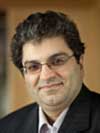 Hassan Ansari (member of the Institute for Advanced Study, Princeton, 2013-2017), PhD, earned his doctorate at the École Pratique des Hautes Études (EPHE) of the Sorbonne, Paris. He also studied at the Ḥawza ʿIlmiyya, Tehran and Qum, where his work focused on the study of philosophy, theology, canon law, and legal theory. His publications include Accusations of unbelief in Islam: A diachronic perspective on takfīr (ed. with Camilla Adang, Maribel Fierro, Sabine Schmidtke, Leiden: Brill (Islamic History and Civilization, in press); Bar-rassī-hā-yī tārīkhī dar ḥawza-yi Islām wa tashayyuʿ: Majmūʿa-yi nawad maqāla wa yaddāsht (Tehran 1390/2012); L’imamat et l’Occultation selon l’imamisme: Étude bibliographique et histoire des textes (Leiden: Brill, forthcoming); and a critical edition of Ibn al-Malāḥimī’s Tuḥfat al-mutakallimīn fī l-radd ʿalā l-falāsifa (Tehran 2008, with Wilferd Madelung).
Hassan Ansari (member of the Institute for Advanced Study, Princeton, 2013-2017), PhD, earned his doctorate at the École Pratique des Hautes Études (EPHE) of the Sorbonne, Paris. He also studied at the Ḥawza ʿIlmiyya, Tehran and Qum, where his work focused on the study of philosophy, theology, canon law, and legal theory. His publications include Accusations of unbelief in Islam: A diachronic perspective on takfīr (ed. with Camilla Adang, Maribel Fierro, Sabine Schmidtke, Leiden: Brill (Islamic History and Civilization, in press); Bar-rassī-hā-yī tārīkhī dar ḥawza-yi Islām wa tashayyuʿ: Majmūʿa-yi nawad maqāla wa yaddāsht (Tehran 1390/2012); L’imamat et l’Occultation selon l’imamisme: Étude bibliographique et histoire des textes (Leiden: Brill, forthcoming); and a critical edition of Ibn al-Malāḥimī’s Tuḥfat al-mutakallimīn fī l-radd ʿalā l-falāsifa (Tehran 2008, with Wilferd Madelung).
Michal Biran - History of the Mongol Period
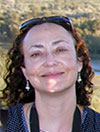
Michal Biran is the Max and Sophie Mydans Foundation Professor in the Humanities at the Hebrew University of Jerusalem and a member of the Israeli Academy of Science and Humanities. Currently (2018) she is the director of the Louis Frieberg Center for East Asian Studies at the Hebrew University of Jerusalem, where she has also led the ERC-funded project “Mobility, Empire and Cross-Cultural Contacts in Mongol Eurasia.” She is a historian of Inner Asia who has published extensively on Mongol and Pre-Mongol Central Asia (10th-14th centuries); the Mongol Empire; nomadism; Kitans and Qara Khitai; and cross-cultural contacts between China and the Islamic world. Her books include Qaidu and the Rise of the Independent Mongol State in Central Asia (Curzon, 1997, 2013), The Empire of the Qara Khitai in Eurasian History: Between China and the Islamic World (Cambridge University Press, 2005, 2008) and Chinggis Khan (Oxford: OneWorld Publications, 2007, 2016). She has co-edited, with Reuven Amitai, Mongols, Turks and Others: Eurasian Nomads and the Sedentary World (Leiden: Brill, 2005) and Nomads As Agents of Cultural Change (Hawaii University Press, 2015), as well as edited In the Service of The Khans: Elites in Transition in Mongol Eurasia (Asiatische Studien 2017.4) and Mobility and Transformations in Mongol Eurasia (JESHO 2018, forthcoming).
Gerhard Bowering - Sufism
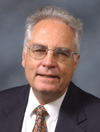
Gerhard Bowering has been Professor of Islamic Studies at Yale University since 1984. Dr. Bowering obtained his baccalaureate degree from the Deutsches Gymansium Wurzburg in 1959; his Ph.L. in Philosophy from the Philosophische Hoschschule Pullach in 1964; his Th.L. from the Université de Montréal in 1971; and his Ph.D. in Islamic Studies from McGill University in 1975. From 1985 to 1984 he served as Assistant/Associate Professor at the University of Pennsylvania. Dr. Bowering is a member of the American Philosophical Society and the American Oriental Society; he is a recipient of a Guggenheim and a Mellon fellowship; and he is a Visiting Professor at Princeton University and Innsbruck University. His scholarly publications focus on Sufism and the literature of the Qur’anic commentary. He is Editor-in-chief of the Encyclopaedia of Islamic Political Thought (Princeton Press, 2012).
Carlo Cereti - Sasanian History
 Carlo Cereti is Professor of Iranian Studies at the “Sapienza” University of Rome and Cultural Counselor at the Italian Embassy in Iran. His main fields of research are Middle Iranian languages, history of the Parthian and Sasanian periods and Iran’s religious history. His major publications include An 18th Century Account of Parsi History - The Qesse-ye Zartoštiān-e Hendustān, IUO, Naples 1991; The Zand ī Wahman Yasn. A Sasanian Apocalypse, Serie Orientale Roma 75, IsIAO, Rome 1995; La Letteratura Pahlavi. Introduzione ai testi con riferimenti alla storia degli studi e alla tradizione manoscritta, Mimesis, Milan 2001; and (et al.) Glyptic Antiquities from the Museum of Khoy, Western Azerbaijan, Iran; Reports and Memoires, N.S. 8, IsIAO, Rome 2009.
Carlo Cereti is Professor of Iranian Studies at the “Sapienza” University of Rome and Cultural Counselor at the Italian Embassy in Iran. His main fields of research are Middle Iranian languages, history of the Parthian and Sasanian periods and Iran’s religious history. His major publications include An 18th Century Account of Parsi History - The Qesse-ye Zartoštiān-e Hendustān, IUO, Naples 1991; The Zand ī Wahman Yasn. A Sasanian Apocalypse, Serie Orientale Roma 75, IsIAO, Rome 1995; La Letteratura Pahlavi. Introduzione ai testi con riferimenti alla storia degli studi e alla tradizione manoscritta, Mimesis, Milan 2001; and (et al.) Glyptic Antiquities from the Museum of Khoy, Western Azerbaijan, Iran; Reports and Memoires, N.S. 8, IsIAO, Rome 2009.
Jamsheed K. Choksy - Modern Zoroastrianism
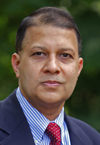
Jamsheed K. Choksy (B.A., Columbia University; Ph.D., Harvard University) is Professor of Iranian Studies in the departments of Central Eurasian Studies, History, India Studies, and Religious Studies, and is an Affiliated Faculty Member of the Middle Eastern and Islamic Studies Program and the International Studies Program at Indiana University. He also served as Chairman of the Department of Near Eastern Languages and Cultures, and as Director of the Middle Eastern Studies Program there. Dr. Choksy was nominated by the President of the USA and confirmed by the US Senate as a member of the National Council on the Humanities overseeing the National Endowment for the Humanities (2008–2014).
Farhad Daftary - Ismailism
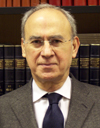
Farhad Daftary received his Ph.D. from the University of California, Berkeley. He has held various academic posts and since 1988 has been affiliated with The Institute of Ismaili Studies in London, where he is currently Co-Director and Head of the Department of Academic Research and Publications. Dr. Daftary is a consulting editor of the Encyclopaedia Iranica, co-editor (with W. Madelung) of the Encyclopaedia Islamica, as well as the general editor of the Ismaili Heritage Series and the Ismaili Texts and Translations Series. An authority on Ismaili studies, he has written and edited a dozen books in this field, including The Ismā'īlīs: Their History and Doctrines (1990; 2nd ed., 2007); The Assassin Legends (1994); A Short History of the Ismailis (1998); Ismaili Literature: A Bibliography of Sources and Studies (2004), and (with Z. Hirji) The Ismailis: An Illustrated History (2008). He has also written more than 50 articles and book chapters and some 150 encyclopaedia entries. Dr. Daftary’s books have been translated into Arabic, Persian, Turkish, Urdu, Gujarati and numerous European languages.
Richard M. Eaton - Indo-Persian Studies

After graduating from the College of Wooster in 1962, Richard M. Eaton lived in Tabriz for two years with the first group of American Peace Corps Volunteers to Iran. While there, he made a trip through India and Pakistan and acquired a deep fascination with the many historical connections between South Asia and the Iranian plateau. His research interests focus on the social and cultural history of medieval and early modern India (1000-1800), and especially on the range of interactions between Islamic and Indian cultures that took place at that time. These include Sufism, architecture, the rise of Islam in Bengal, Indo-Islamic traditions, and slavery.
Willem Floor - Material Culture
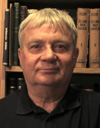
Willem Floor studied development economics and non-western sociology in addition to Persian, Arabic and Islamology from 1963-67 at the University of Utrecht. In 1971 he received his doctoral degree from the University of Leyden. From 1968-83 he worked in a variety of functions for the Dutch Ministry of Development Cooperation. From 1983-2002 he was employed by the World Bank as an energy specialist. He is currently an independent scholar. Dr. Floor has written more than 260 articles and books on a large variety of subjects concerning the social-economic history of Iran.
Bahram Grami - Flora
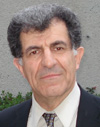
Bahram Grami received his BS and MS in agricultural science from Tehran University and American University of Beirut, respectively, and his PhD in plant science from University of Manitoba, Canada. He was a researcher at the Agricultural Research Organization of Iran and a faculty member of Isfahan University of Technology until he left Iran for the US in 1985. He was a researcher at the University of California, Davis until 1995 and later served as scientific editor in American Association of Cereal Chemists and American Phytopathological Society. The second edition of his book, Flowers and Plants in a Thousand Years of Persian Poetry, with an introduction by late Iraj Afshar, was published in 2010. His latest books, Precious Stones in a Thousand Years of Persian Poetry and Plants in Qur'an, were published in 2015 and 2016, respectively.
Keith Hitchins - Caucasian Studies and Kurdish Studies

Keith Hitchins is Professor of History at the University of Illinois, Urbana-Champaign and holds a Ph.D. from Harvard University. He offers courses and conducts research on Southeastern Europe between the 14th century and the present, the Kurds of Turkey and Iraq, the Caucasus (especially Azerbaijan and Georgia), and Central Asia (in particular the Tajiks and Uzbeks). His special interest is intellectual and cultural history, and his publications include Rumania, 1866-1947 (Oxford History of Modern Europe) (1994), The Identity of Romania (2009), and numerous articles on the above-mentioned subjects. He is editor of the Journal of Kurdish Studies.
Agnes Korn - Linguistics
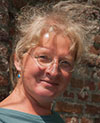
Agnes Korn studied Indo-European linguistics in Hamburg and Vienna (MA thesis on the metrics of the Rigveda). After a year in Banská Bystrica, Slovakia, teaching German as a foreign language and a position in Graz, Austria, on a lexicographical project in Persian, she moved to Frankfurt, Germany, to do a PhD in comparative linguistics (thesis on the historical grammar of Balochi), followed by a “habilitation” on Iranian linguistics. In 2015, she joined the CNRS in Paris as a researcher in linguistics; she is member of the research unit “Mondes iranien et indien.” Her current projects include the description of Iranian minority languages and their dialects (particularly Bashkardi and Balochi) as well as historical linguistics (grammaticalisation and modelling relations among the Iranian languages).
C.C. Lamberg-Karlovsky - Central Asian Art and Archeology
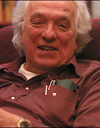
Professor C.C. Lamberg-Karlovsky was born in Prague, Czechoslovakia in 1937. He earned a B.A. from Dartmouth College in 1959, served as a Benjamin Franklin fellow at Yale University from 1961-1962 and obtained his Ph.D. from the University of Pennsylvania in 1965. His first teaching position was at Franklin and Marshall College, Lancaster, Pennsylvania. In 1966 he joined the Department of Anthropology at Harvard University becoming a Professor in 1971. From 1977 to 1990 he served as the Director of the Peabody Museum of Archaeology and Ethnology at Harvard University where he is presently the Stephen Phillips Professor of Archaeology. Professor Lamberg-Karlovsky has directed archaeological excavations in Jordan, Syria, Saudi Arabia, the Central Asian Republics of the former U.S.S.R., the Sultanate of Oman, Iran and most recently in Pakistan.
Sergio La Porta - Early Armenia and Irano-Armenian Relations
 Sergio La Porta is the Haig and Isabel Berberian Professor of Armenian Studies at California State University, Fresno. He is the author of numerous studies on medieval Armenian intellectual and political history, philology, and apocalyptic literature, including a three-volume study on Armenian commentaries on the works of Dionysius the Areopagite (Peeters, 2008). He has co-edited with K. Bardakjian a volume entitled, The Armenian Apocalyptic Tradition: A Comparative Perspective SVTP 25 (Brill, 2014), and a volume with B. Crostini, Negotiating Co-existence: Communities, Cultures and ‘Convivencia’ in Byzantine Society. BAC 96 (WVT, 2013). He is currently the Editor of the Journal of the Society for Armenian Studies.
Sergio La Porta is the Haig and Isabel Berberian Professor of Armenian Studies at California State University, Fresno. He is the author of numerous studies on medieval Armenian intellectual and political history, philology, and apocalyptic literature, including a three-volume study on Armenian commentaries on the works of Dionysius the Areopagite (Peeters, 2008). He has co-edited with K. Bardakjian a volume entitled, The Armenian Apocalyptic Tradition: A Comparative Perspective SVTP 25 (Brill, 2014), and a volume with B. Crostini, Negotiating Co-existence: Communities, Cultures and ‘Convivencia’ in Byzantine Society. BAC 96 (WVT, 2013). He is currently the Editor of the Journal of the Society for Armenian Studies.
Scott Levi - Modern Central Asia
 Scott Levi is Professor of Central Asian History at the Ohio State University. He earned his B.A. in Religion and South Asian Studies from the University of Iowa (1991), and his Ph.D. in History from the University of Wisconsin-Madison (2000). He works mainly on the social and economic history of early modern Central Asia, and his work aims to place the region in a broader, world historical context. He has published a number of books, the most recent of which is The Rise and Fall of Khoqand, 1709–1876: Central Asia in the Global Age (Pittsburgh, 2017). He is currently finishing another book project, Early Modern Connections: Global Integration and the 18 th -Century Bukharan Crisis, and he also serves as the editor-in- chief for the Oxford Research Encyclopedia for Asian Commercial History.
Scott Levi is Professor of Central Asian History at the Ohio State University. He earned his B.A. in Religion and South Asian Studies from the University of Iowa (1991), and his Ph.D. in History from the University of Wisconsin-Madison (2000). He works mainly on the social and economic history of early modern Central Asia, and his work aims to place the region in a broader, world historical context. He has published a number of books, the most recent of which is The Rise and Fall of Khoqand, 1709–1876: Central Asia in the Global Age (Pittsburgh, 2017). He is currently finishing another book project, Early Modern Connections: Global Integration and the 18 th -Century Bukharan Crisis, and he also serves as the editor-in- chief for the Oxford Research Encyclopedia for Asian Commercial History.
William Malandra - Zoroastrianism
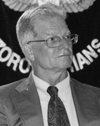 William Malandra was born in 1942 in Philadelphia and received a B.A. in Philosophy from Haverford College 1964. He then obtained an M.A. in Religious Studies at Brown University 1966 and completed a PhD degree at the University of Pennsylvania in Indo-Iranian philology 1971. His dissertation was on the Fravaši Yašt under the direction of Professor Mark Dresden. He taught courses on ancient India and Iran at the University of Minnesota for 30 years. After retiring in 2003 he was an adjunct in Asian Studies at the University of Texas until 2007, teaching courses on Zoroastrianism and ancient Iran. He now resides in Durango, CO.
William Malandra was born in 1942 in Philadelphia and received a B.A. in Philosophy from Haverford College 1964. He then obtained an M.A. in Religious Studies at Brown University 1966 and completed a PhD degree at the University of Pennsylvania in Indo-Iranian philology 1971. His dissertation was on the Fravaši Yašt under the direction of Professor Mark Dresden. He taught courses on ancient India and Iran at the University of Minnesota for 30 years. After retiring in 2003 he was an adjunct in Asian Studies at the University of Texas until 2007, teaching courses on Zoroastrianism and ancient Iran. He now resides in Durango, CO.
Rudi Matthee - Safavid History
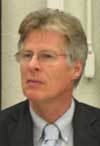
Rudi Matthee is Munroe Professor of History at the University of Delaware, where he has taught since 1993. He received his Ph.D. from UCLA in 1991. His research focus is on the political and socioeconomic history of early modern Iran and the Persian Gulf. He is the author of The Politics of Trade in Safavid Iran: Silk for Silver, 16001730 (1999); The Pursuit of Pleasure: Drugs and Stimulants in Iranian History, 1500-1900 (2005); Persia in Crisis: Safavid Decline and the Fall of Isfahan (2012), and co-author of The Monetary History of Iran, From the Safavids to the Qajars (2013), and some 50 articles on aspects of Iranian and Egyptian history and culture. He also coedited Iran and Beyond: Essays in Honor of Nikki R. Keddie (2000); Iran and the Surrounding World, 15012001: Interactions in Culture and Cultural Politics (2002), and Portugal, the Persian Gulf, and Safavid Persia (2011). He is coeditor of Der Islam, and served as President of the Association for the Study of Persianate Societies, 2003-05, and 2009-11.
Mahmoud Omidsalar - Folklore
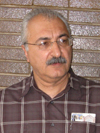 Mahmoud Omidsalar obtained his Ph.D. in Persian Literature from the Department of Near Eastern Studies, University of California, Berkeley, where he also studied Folklore under Alan Dundes. In addition to publishing many essays on Persian literature and folklore, he has also edited the 6th volume of the new critical edition of the Shāh-nāma, under the general editorship of Professors Khaleghi-Motlagh and Ehsan Yarshater. He has served on the editorial board of the Encyclopeadia Iranica since 1990, and was appointed to the Supreme Council of the Center for the Great Islamic Encyclopaedia (Tehran) in 2006. Together with Iraj Afshar, he edits the series Folia Medica Iranica and Persian Manuscripts in Facsimile. In 2004, the first volume of his collected English and Persian papers received the book of the year award of the Ministry of Culture and Islamic Guidance in Iran. His current project is a critical edition of the poem Garšāsp-nāma, which was composed in 1066 CE. Dr. Omidsalar is retired from the John F. Kennedy Memorial Library at California State University, Los Angeles, and is now a resident scholar at Dr. Samuel M. Jordan Center for Persian Studies of the University of California at Irvine.
Mahmoud Omidsalar obtained his Ph.D. in Persian Literature from the Department of Near Eastern Studies, University of California, Berkeley, where he also studied Folklore under Alan Dundes. In addition to publishing many essays on Persian literature and folklore, he has also edited the 6th volume of the new critical edition of the Shāh-nāma, under the general editorship of Professors Khaleghi-Motlagh and Ehsan Yarshater. He has served on the editorial board of the Encyclopeadia Iranica since 1990, and was appointed to the Supreme Council of the Center for the Great Islamic Encyclopaedia (Tehran) in 2006. Together with Iraj Afshar, he edits the series Folia Medica Iranica and Persian Manuscripts in Facsimile. In 2004, the first volume of his collected English and Persian papers received the book of the year award of the Ministry of Culture and Islamic Guidance in Iran. His current project is a critical edition of the poem Garšāsp-nāma, which was composed in 1066 CE. Dr. Omidsalar is retired from the John F. Kennedy Memorial Library at California State University, Los Angeles, and is now a resident scholar at Dr. Samuel M. Jordan Center for Persian Studies of the University of California at Irvine.
Osman G. Özgüdenlı - Perso-Turkish Studies
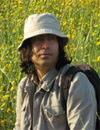
Osman G. Özgüdenlı was born in Kayseri in 1973. He graduated with a History degree from the Atatürk Education Faculty of Marmara University in 1992 and obtained his Master’s degree in Medieval history at the Institute of Turkic Studies at Marmara University in 1994. His research focuses primarily on the medieval history and culture of Iran (from the 11th to the 15th centuries,) cultural relations between Iranians and Turks in the Middle Ages, the Mongols in Iran, Islamic manuscripts and Seljuk numismatics. His doctoral research was published as Ghazan Khan and His Reforms (694-703/1295-1304) (Istanbul, 2000). In order to study resources related to the medieval history of Iran, he conducted research in a number of Iranian cities, in particular Tehran, Mashhad, Qom, Isfahan, Tabriz and Ardabil in the years 1995-1997, 1998, 2001, 2003, 2004 and 2005. He spent the years 2005-2007 studying in Berlin. He is currently in charge of the Institute of Middle East Studies, Department of Middle Eastern Political History and International Relations and the Institute of Turkic Studies, Department of Medieval History at Marmara University
Antonio C. D. Panaino, - Iranian Philology, Religion, and History (Pre-Islamic Periods)
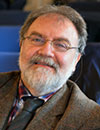
Prof. Antonio C. D. Panaino, (Laurea in Milan State University; Ph.D. at the “Orientale”, Naples) is Full Professor of Iranian Studies at the “Alma Mater Studiorum, University of Bologna”. Dean of the “Faculty for the Preservation of the Cultural Heritage” for 6 years in the Ravenna Branch of the Unibo, Prof. Panaino was Secretary and, then, President of the Societas Iranologica Europaea. He has also directed the Emilia-Romagna section of the IsIAO, has founded with other scholars the International Association «MELAMMU» dedicated to the study of the intercultural phenomena in antiquity with special regard for the heritage of the Assyrian and Babylonian cultures. In 2011 he got the Laurea ad honorem of the New Bulgarian University, Sophia. Prof. Panaino has been Director of the Italian Scientific Mission in Tajikistan and Chairman of the Italian Association for the Study of the Caucasus and Central Asia (ASIAC). His main research interests Avestan, Pahlavi and generally Mazdean literatures; history of religions in Pre-Islamic Iran; the mutual influences between Byzantium and the Sasanian with special interest for the subject of sacred royalty; Uranography, Astronomy and Astrology in the ancient world with a particular focus on the Iranian area.
Daniel T. Potts - Ancient Near Eastern Archaeology and History
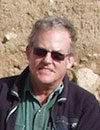
Daniel T. Potts is Professor of Ancient Near Eastern Archaeology and History at NYU. D.T. Potts received his AB (1975) and PhD (1980) in Anthropology from Harvard, specializing in Near Eastern archaeology. He taught previously at the Freie Universität Berlin (1981-86), the University of Copenhagen (1980-81, 1986-1991) and the University of Sydney (1991-2012) where he held the Edwin Cuthbert Hall Chair of Middle Eastern Archaeology. His main areas of interest are Iran, Mesopotamia and the Persian Gulf and as a field archaeologist he has conducted excavations in Iran, Saudi Arabia, Turkey and the United Arab Emirates. The founding editor-in-chief of the journal Arabian Archaeology & Epigraphy, he is a Corresonding Member of the German Archaeological Institute and ISMEO (Associazione Internazionale di Studi sul Mediterraneo e l'Oriente). His books include Nomadism in Iran: From antiquity to the modern era (2014), In the Land of the Emirates: The archaeology and history of the UAE (2012); Mesopotamia, Iran and Arabia from the Seleucids to the Sasanians (2010); Excavations at Tepe Yahya, 1967-1975: The third millennium (2001); Ancient Magan: The secrets of Tell Abraq (2001); The Archaeology of Elam (1999, second revised edition 2016); Mesopotamian Civilization: The material foundations (1997); Supplement to the Pre-Islamic Coinage of Eastern Arabia (1994); Further excavations at Tell Abraq: The 1990 season (1991); The Pre-Islamic Coinage of Eastern Arabia (1991); A prehistoric mound in the Emirate of Umm al-Qaiwain: Excavations at Tell Abraq in 1989 (1990); The Arabian Gulf in Antiquity (1990); and Miscellanea Hasaitica (1989). He is the editor of the two volume Blackwell Companion to the Archaeology of the Ancient Near East (2012) and the Oxford Handbook of Iranian Archaeology (2013).
Nicholas Sims-Williams - Iranian Languages and Central Asian Studies
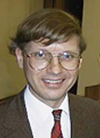 Nicholas Sims-Williams is Emeritus Professor of Iranian and Central Asian Studies at the School of Oriental and African Studies, University of London. He studied Iranian languages and Sanskrit at Cambridge University and went on to do a Ph.D. there under Dr. Ilya Gershevitch, his thesis being an edition of a fragmentary manuscript containing Christian texts translated from Syriac into Sogdian, the Iranian language of medieval Samarkand. This was later published as The Christian Sogdian manuscript C2, Berlin 1985, and awarded the Prix Ghirshman of the Institut de France. Professor Sims-Williams was elected a Fellow of the British Academy in 1988 and is also a member of the French and Austrian Academies. He is particularly interested in the Middle Iranian languages of pre-Islamic Iran, Afghanistan and Central Asia, being equally fascinated by the languages themselves, with their Indo-European roots, and by their Central Asian setting, with its stimulating mixture of languages, cultures, and religions. At present he is engaged in deciphering and publishing a cache of documents in the little-known Bactrian language (see Bactrian Documents from Northern Afghanistan, I: Legal and Economic Documents, Oxford, 2000).
Nicholas Sims-Williams is Emeritus Professor of Iranian and Central Asian Studies at the School of Oriental and African Studies, University of London. He studied Iranian languages and Sanskrit at Cambridge University and went on to do a Ph.D. there under Dr. Ilya Gershevitch, his thesis being an edition of a fragmentary manuscript containing Christian texts translated from Syriac into Sogdian, the Iranian language of medieval Samarkand. This was later published as The Christian Sogdian manuscript C2, Berlin 1985, and awarded the Prix Ghirshman of the Institut de France. Professor Sims-Williams was elected a Fellow of the British Academy in 1988 and is also a member of the French and Austrian Academies. He is particularly interested in the Middle Iranian languages of pre-Islamic Iran, Afghanistan and Central Asia, being equally fascinated by the languages themselves, with their Indo-European roots, and by their Central Asian setting, with its stimulating mixture of languages, cultures, and religions. At present he is engaged in deciphering and publishing a cache of documents in the little-known Bactrian language (see Bactrian Documents from Northern Afghanistan, I: Legal and Economic Documents, Oxford, 2000).
Prods Oktor Skjaervo - Old and Middle Iranian Languages
 Prods Oktor Skjaervo is the Aga Khan Professor of Iranian Studies at the Department of Near Eastern Languages and Civilization of Harvard University. He is a Norwegian national and a student of Old Iranian languages (Avestan, Pahlavi, etc.), literatures, and religions (Zoroastrianism, Manicheism), in addition to Iranian dialects. He was Assistant Editor and Senior Assistant Editor of the Encyclopædia Iranica from 1985 until 1991, when he was appointed to Harvard University. Among his numerous publications are several articles for the Encyclopædia Iranica, including, “Aždahā,” “Iranian words in Chinese texts,” “Iranian Languages and Scripts,” and, more recently, “Jamšīd” and “Kayanids.”
Prods Oktor Skjaervo is the Aga Khan Professor of Iranian Studies at the Department of Near Eastern Languages and Civilization of Harvard University. He is a Norwegian national and a student of Old Iranian languages (Avestan, Pahlavi, etc.), literatures, and religions (Zoroastrianism, Manicheism), in addition to Iranian dialects. He was Assistant Editor and Senior Assistant Editor of the Encyclopædia Iranica from 1985 until 1991, when he was appointed to Harvard University. Among his numerous publications are several articles for the Encyclopædia Iranica, including, “Aždahā,” “Iranian words in Chinese texts,” “Iranian Languages and Scripts,” and, more recently, “Jamšīd” and “Kayanids.”
Brian Spooner - Anthropology
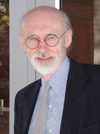 After obtaining a B.A. at Oxford in Persian and Pahlavi, Brian Spooner served as Assistant Director of the British Institute of Persian Studies in Tehran before completing an Oxford D.Phil. on the Baloch in Social Anthropology. He then began his teaching career at the University of Pennsylvania, punctuated by spells of ethnographic research in eastern Iran, Afghanistan, Pakistan and Tajikistan. His publications include "Weavers and Dealers: The authenticity of an Oriental Carpet, "in The Social Life of Things, Cambridge University Press, 1986, and Reading Nasta'liq: Persian and Urdu Hands 1500 to the Present, Mazda Publications, 1995, 2007, with William L. Hanaway.
After obtaining a B.A. at Oxford in Persian and Pahlavi, Brian Spooner served as Assistant Director of the British Institute of Persian Studies in Tehran before completing an Oxford D.Phil. on the Baloch in Social Anthropology. He then began his teaching career at the University of Pennsylvania, punctuated by spells of ethnographic research in eastern Iran, Afghanistan, Pakistan and Tajikistan. His publications include "Weavers and Dealers: The authenticity of an Oriental Carpet, "in The Social Life of Things, Cambridge University Press, 1986, and Reading Nasta'liq: Persian and Urdu Hands 1500 to the Present, Mazda Publications, 1995, 2007, with William L. Hanaway.
Maria Szuppe - Tajikistan
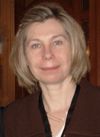 Maria Szuppe (Ph.D. Sorbonne Nouvelle, Paris, 1991) is Research Fellow at the Centre National de la Recherche Scientifique, first in Strasbourg, then in Paris with the “Mondes iranien et indien” research group. In 1997-1998, she acted as Scientific Secretary at the Institut Français d’Études sur l’Asie Centrale, Tashkent (Uzbekistan). She was a Visiting Scholar at the Oriental Faculty, University of Cambridge (1992-1993), and at the Institute for Languages and Cultures of Asia and Africa, Tokyo University of Foreign Studies (2009). Her main field of research is late mediaeval and early modern history and culture of Iranian societies, especially during the Timurid, Safavid, and Uzbek periods. She is co-founder and Scientific Director of Series Catalogorum published by CNRS “Mondes iranien et indien” and Istituto per l’Oriente (Rome), and Editorial Secretary of Studia Iranica, international bi-annual research journal.
Maria Szuppe (Ph.D. Sorbonne Nouvelle, Paris, 1991) is Research Fellow at the Centre National de la Recherche Scientifique, first in Strasbourg, then in Paris with the “Mondes iranien et indien” research group. In 1997-1998, she acted as Scientific Secretary at the Institut Français d’Études sur l’Asie Centrale, Tashkent (Uzbekistan). She was a Visiting Scholar at the Oriental Faculty, University of Cambridge (1992-1993), and at the Institute for Languages and Cultures of Asia and Africa, Tokyo University of Foreign Studies (2009). Her main field of research is late mediaeval and early modern history and culture of Iranian societies, especially during the Timurid, Safavid, and Uzbek periods. She is co-founder and Scientific Director of Series Catalogorum published by CNRS “Mondes iranien et indien” and Istituto per l’Oriente (Rome), and Editorial Secretary of Studia Iranica, international bi-annual research journal.
Ameneh Youssefzadeh - Music (Co-Consulting Editor)
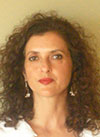 Ameneh Youssefzadeh received her PhD in music (ethnomusicology) from Nanterre University, Paris X. Her research interests include: the musical repertoire of the various ethnic groups of Khorasan (northeastern Iran), the music of Iran, Central Asia, music and mysticism, women and music, and music and censorship. From 1997 to 2012 she was an Associate Researcher at the CNRS (French National Scientific Research Center) UMR 7528 as well as a member of the French Society of Ethnomusicology. Youssefzadeh has been a visiting scholar at Columbia University (2008-09) and at The City University of New York at The Graduate Center (2009-15). She is currently the Co-Consulting Editor of music for the Encyclopædia Iranica. Her articles appear in British Journal of Ethnomusicology, Cahiers de musiques traditionnelles, Iranian Studies, Faslnāme Mahoor, and in several edited volumes. Her first monograph, Les bardes du Khorassan iranien: le bakhshi et son répertoire (Paris: Peeters, 2002) was translated into Persian in 2010 (Rāmeshgarān-e shomāl-e Khorasan: bakhshi va repertoir-e u Tehran: Mahoor).
Ameneh Youssefzadeh received her PhD in music (ethnomusicology) from Nanterre University, Paris X. Her research interests include: the musical repertoire of the various ethnic groups of Khorasan (northeastern Iran), the music of Iran, Central Asia, music and mysticism, women and music, and music and censorship. From 1997 to 2012 she was an Associate Researcher at the CNRS (French National Scientific Research Center) UMR 7528 as well as a member of the French Society of Ethnomusicology. Youssefzadeh has been a visiting scholar at Columbia University (2008-09) and at The City University of New York at The Graduate Center (2009-15). She is currently the Co-Consulting Editor of music for the Encyclopædia Iranica. Her articles appear in British Journal of Ethnomusicology, Cahiers de musiques traditionnelles, Iranian Studies, Faslnāme Mahoor, and in several edited volumes. Her first monograph, Les bardes du Khorassan iranien: le bakhshi et son répertoire (Paris: Peeters, 2002) was translated into Persian in 2010 (Rāmeshgarān-e shomāl-e Khorasan: bakhshi va repertoir-e u Tehran: Mahoor).
Adam Becker - Assyrians
Stephen Blum - Music
Agnes Devictor - Media Studies
Devin A. DeWeese - Medieval and Pre-Modern Central Asia
Desmond Durkin-Meisterernst - Manicheism
Ali Gheissari - Twentieth-Century Intellectual History
Edmund Herzig - Armenia
Sooyong Kim - Ottoman-Iranian Cultural Relations
Paul Losensky - Classical Persian Literature
Lutz Richter-Bernburg - History of Medicine
Houman M. Sarshar - Judeo-Persian Studies
Rüdiger Schmitt - Comparative Indo-European Linguistics and Indo-Iranian Studies
Priscilla Soucek - Art History
Ernest Tucker - Zand and Afsharid Periods

